小说Araby两个译本之评析
《阿拉比》与《一段回忆》关注点之比较
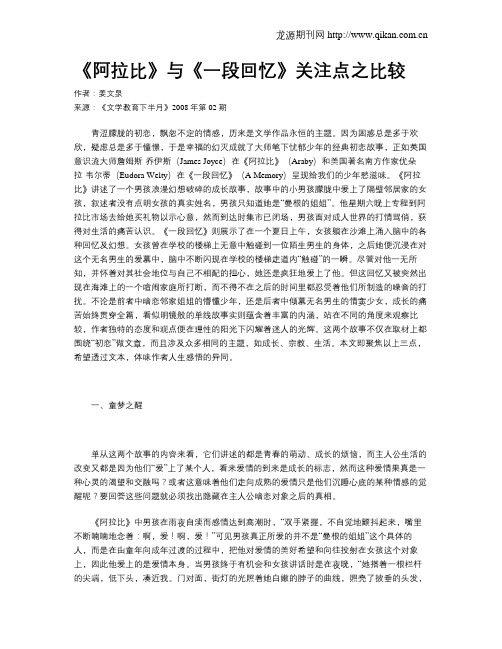
《阿拉比》与《一段回忆》关注点之比较作者:姜文泉来源:《文学教育下半月》2008年第02期青涩朦胧的初恋,飘忽不定的情感,历来是文学作品永恒的主题。
因为困惑总是多于欢欣,疑虑总是多于憧憬,于是幸福的幻灭成就了大师笔下忧郁少年的经典初恋故事,正如英国意识流大师詹姆斯·乔伊斯(James Joyce)在《阿拉比》(Araby)和美国著名南方作家优朵拉·韦尔蒂(Eudora Welty)在《一段回忆》(A Memory)呈现给我们的少年愁滋味。
《阿拉比》讲述了一个男孩浪漫幻想破碎的成长故事,故事中的小男孩朦胧中爱上了隔壁邻居家的女孩,叙述者没有点明女孩的真实姓名,男孩只知道她是“曼根的姐姐”。
他星期六晚上专程到阿拉比市场去给她买礼物以示心意,然而到达时集市已闭场,男孩面对成人世界的打情骂俏,获得对生活的痛苦认识。
《一段回忆》则展示了在一个夏日上午,女孩躺在沙滩上涌入脑中的各种回忆及幻想。
女孩曾在学校的楼梯上无意中触碰到一位陌生男生的身体,之后她便沉浸在对这个无名男生的爱慕中,脑中不断闪现在学校的楼梯走道内“触碰”的一瞬。
尽管对他一无所知,并怀着对其社会地位与自己不相配的担心,她还是疯狂地爱上了他。
但这回忆又被突然出现在海滩上的一个喧闹家庭所打断,而不得不在之后的时间里都忍受着他们所制造的噪音的打扰。
不论是前者中暗恋邻家姐姐的懵懂少年,还是后者中倾慕无名男生的情窦少女,成长的痛苦始终贯穿全篇,看似明镜般的单线故事实则蕴含着丰富的内涵,站在不同的角度来观察比较,作者独特的态度和观点便在理性的阳光下闪耀着迷人的光辉。
这两个故事不仅在取材上都围绕“初恋”做文章,而且涉及众多相同的主题,如成长、宗教、生活。
本文即聚焦以上三点,希望透过文本,体味作者人生感悟的异同。
一、童梦之醒单从这两个故事的内容来看,它们讲述的都是青春的萌动、成长的烦恼,而主人公生活的改变又都是因为他们“爱”上了某个人,看来爱情的到来是成长的标志,然而这种爱情果真是一种心灵的渴望和交融吗?或者这意味着他们走向成熟的爱情只是他们沉睡心底的某种情感的觉醒呢?要回答这些问题就必须找出隐藏在主人公暗恋对象之后的真相。
araby中英对照译文
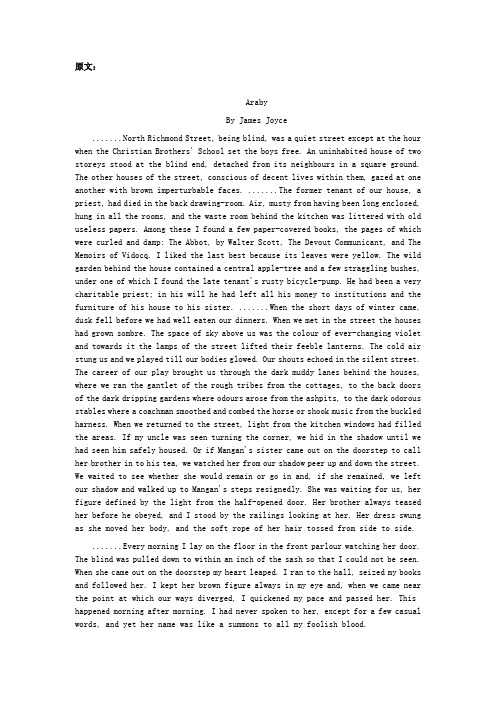
原文:ArabyBy James Joyce.......North Richmond Street, being blind, was a quiet street except at the hour when the Christian Brothers' School set the boys free. An uninhabited house of two storeys stood at the blind end, detached from its neighbours in a square ground. The other houses of the street, conscious of decent lives within them, gazed at one another with brown imperturbable faces. .......The former tenant of our house, a priest, had died in the back drawing-room. Air, musty from having been long enclosed, hung in all the rooms, and the waste room behind the kitchen was littered with old useless papers. Among these I found a few paper-covered books, the pages of which were curled and damp: The Abbot, by Walter Scott, The Devout Communicant, and The Memoirs of Vidocq. I liked the last best because its leaves were yellow. The wild garden behind the house contained a central apple-tree and a few straggling bushes, under one of which I found the late tenant's rusty bicycle-pump. He had been a very charitable priest; in his will he had left all his money to institutions and the furniture of his house to his sister. .......When the short days of winter came, dusk fell before we had well eaten our dinners. When we met in the street the houses had grown sombre. The space of sky above us was the colour of ever-changing violet and towards it the lamps of the street lifted their feeble lanterns. The cold air stung us and we played till our bodies glowed. Our shouts echoed in the silent street. The career of our play brought us through the dark muddy lanes behind the houses, where we ran the gantlet of the rough tribes from the cottages, to the back doors of the dark dripping gardens where odours arose from the ashpits, to the dark odorous stables where a coachman smoothed and combed the horse or shook music from the buckled harness. When we returned to the street, light from the kitchen windows had filled the areas. If my uncle was seen turning the corner, we hid in the shadow until we had seen him safely housed. Or if Mangan's sister came out on the doorstep to call her brother in to his tea, we watched her from our shadow peer up and down the street. We waited to see whether she would remain or go in and, if she remained, we left our shadow and walked up to Mangan's steps resignedly. She was waiting for us, her figure defined by the light from the half-opened door. Her brother always teased her before he obeyed, and I stood by the railings looking at her. Her dress swung as she moved her body, and the soft rope of her hair tossed from side to side........Every morning I lay on the floor in the front parlour watching her door. The blind was pulled down to within an inch of the sash so that I could not be seen. When she came out on the doorstep my heart leaped. I ran to the hall, seized my books and followed her. I kept her brown figure always in my eye and, when we came near the point at which our ways diverged, I quickened my pace and passed her. This happened morning after morning. I had never spoken to her, except for a few casual words, and yet her name was like a summons to all my foolish blood........Her image accompanied me even in places the most hostile to romance. On Saturday evenings when my aunt went marketing I had to go to carry some of the parcels. We walked through the flaring streets, jostled by drunken men and bargaining women, amid the curses of labourers, the shrill litanies of shop-boys who stood on guard by the barrels of pigs' cheeks,the nasal chanting of street-singers, who sang a come-all-you about O'Donovan Rossa, or a ballad about the troubles in our native land. These noises converged in a single sensation of life for me: I imagined that I bore my chalice safely through a throng of foes. Her name sprang to my lips at moments in strange prayers and praises which I myself did not understand. My eyes were often full of tears (I could not tell why) and at times a flood from my heart seemed to pour itself out into my bosom. I thought little of the future. I did not know whether I would ever speak to her or not or, if I spoke to her, how I could tell her of my confused adoration. But my body was like a harp and her words and gestures were like fingers running upon the wires. .......One evening I went into the back drawing-room in which the priest had died. It was a dark rainy evening and there was no sound in the house. Through one of the broken panes I heard the rain impinge upon the earth, the fine incessant needles of water playing in the sodden beds. Some distant lamp or lighted window gleamed below me. I was thankful that I could see so little. All my senses seemed to desire to veil themselves and, feeling that I was about to slip from them, I pressed the palms of my hands together until they trembled, murmuring: `O love! O love!' many times........At last she spoke to me. When she addressed the first words to me I was so confused that I did not know what to answer. She asked me was I going to Araby.I forgot whether I answered yes or no. It would be a splendid bazaar; she said she would love to go. ......."And why can't you?" I asked........While she spoke she turned a silver bracelet round and round her wrist. She could not go, she said, because there would be a retreat that week in her convent. Her brother and two other boys were fighting for their caps, and I was alone at the railings. She held one of the spikes, bowing her head towards me. The light from the lamp opposite our door caught the white curve of her neck, lit up her hair that rested there and, falling, lit up the hand upon the railing. At fell over one side of her dress and caught the white border of a petticoat, just visible as she stood at ease........"It's well for you," she said........"If I go," I said, "I will bring you something.".......What innumerable follies laid waste my waking and sleeping thoughts after that evening! I wished to annihilate the tedious intervening days. I chafed against the work of school. At night in my bedroom and by day in the classroom her image came between me and the page I strove to read. The syllables of the word Araby were called to me through the silence in which my soul luxuriated and cast an Eastern enchantment over me. I asked for leave to go to the bazaar on Saturday night. My aunt was surprised, and hoped it was not some Freemason affair. I answered fewquestions in class. I watched my master's face pass from amiability to sternness; he hoped I was not beginning to idle. I could not call my wandering thoughts together.I had hardly any patience with the serious work of life which, now that it stood between me and my desire, seemed to me child's play, ugly monotonous child's play. .......On Saturday morning I reminded my uncle that I wished to go to the bazaar in the evening. He was fussing at the hallstand, looking for the hat-brush, and answered me curtly: ......."Yes, boy, I know.".......As he was in the hall I could not go into the front parlour and lie at the window. I left the house in bad humour and walked slowly towards the school. The air was pitilessly raw and already my heart misgave me.译文:[爱尔兰]詹姆斯·乔伊斯(1)北里士满街是条死胡同,除了学生放学的时候,这条街从来都是死气沉沉。
从文化翻译视角看小说的汉译——以短篇小说Araby等为例

从文化翻译视角看小说的汉译——以短篇小说Araby等为例王静雯(福州大学,福建福州350108)摘要:该文主要是对美国著名翻译家克利福德·E·兰德斯的“文学译者在翻译过程中不只是翻译词,更多的是对文化的处理”这一论断进行阐述,同时结合例子分析。
文章首先解释了文化和翻译之间紧密的联系,其次对双语能力和双文化能力进行解读,最后提出了一些切实可行的文化补救措施。
关键词:小说;翻译;文化;文化翻译中图分类号:H315.9文献标识码:A文章编号:1009-5039(2016)15-0130-021前言在很多人看来,翻译就是简单地把源语言翻译成目的语,单词看懂了就水到渠成。
然而事实并非如此。
学英语这么多年我们知道,一句话往往单词都看懂了,但意思还是不明白,我想里面原因是诸多的。
也许是句子结构看不懂,语法不过关,或者是按正常翻译,出来的句子不符合逻辑,这一点大概就会涉及文化层面。
一句话或者是一篇文章,往往不只是表面上单词的集合这么简单,它不仅有作者的思想,同时也反映了作者身处的文化背景。
如果翻译仅仅是单词这么简单,那有一本字典就够了,又为什么需要这么多翻译人才。
这就是因为读者需要了解文字背后的信息和故事,而这就需要那些有双语知识的人,对双语社会文化领域都比较了解的人,把相关信息传递给广大读者,这样才能真正达到文化交流,文化融合。
十几年前,《时代》杂志就已经把文学翻译者称为“文化导游”,这在现在看来是十分在理的。
为了更好地知道对源语言文化理解的重要性,这里可以看几个例子。
即使是对那些自认为已经很好掌握了英语的人来说,相信也不会是件容易的事。
Wanking,higgler,monkey’s wedding.首先要明白,这些词肯定不能按正常的思维去理解。
我们首先来看wanking这个词,它其实是英式英语,而higgler则是牙买加对流动商贩的一种称呼,什么叫猴子的婚礼呢?它其实是南非对太阳雨的一种描述。
小说“阿拉比”英文赏析

詹姆斯·乔伊斯是举世公认的二十世纪英国文坛巨匠。
他的早期作品《都柏林人》是一部由十五个故事组成的现实主义短篇小说集。
该小说集以作者的家乡都柏林为背景,生动地描绘了二十世纪初该城市的社会现实和人生百态,深刻地反映出当时社会麻木不仁的瘫痪状态,成功地展示了不同身份的人物同僵死和瘫痪的社会之间的激烈冲突以及他们失败之后痛苦不堪的感受。
作者从童年期、青年期、成年期和社会生活四个方面对这部小说集进行布局,揭示了当时社会政治、经济和道德的瘫痪。
《阿拉比》是该小说集中“童年期”的第三篇,描述的是一个少年对朦胧爱情的浪漫追求以及幻想破灭后的失望和痛苦。
在故事中,乔伊斯细致而深刻地刻画了主人公复杂的内心世界,展示了主人公在认识自我,走向成熟的过程中所经历的困惑、孤独和痛苦。
故事是以第一人称叙述的,主人公是一个天真无邪、正在成熟的少年,他居住的地方名叫“北理查蒙德街”,住处的周围是一些阴森森的楼房、幽暗潮湿的花园和满是泥泞的巷子。
然而,少年对这些并没有深刻的意识,直到他对“曼根的姐姐”产生了朦胧的“爱慕”之情时才有了一种孤独和茫然之感,因为他根本不知道爱情究竟是什么样的,也不知道如何表达自己对姑娘的爱慕之情。
当有一天他朝思暮想的“曼根的姐姐”主动和他说话,并告诉他该去“阿拉比”集市时,他的思想有了变化,他渴望去集市为心爱的姑娘买一份礼物。
可见少年去“阿拉比”的渴望是出于对心中朦胧的爱情的本能追求。
“阿拉比”这个具有阿拉伯异域色彩和东方世界神秘魅力的集市给他带来了希望和诱惑,寄托着他的爱情和理想,象征着他探索与追求的目标。
于是,去“阿拉比”集市意味着他开始了追求理想,寻找自我的“成长之旅”。
然而,当他几经周折到达集市时,“几乎所有的摊棚都关门了。
半个大厅里黑沉沉的。
我有一种孤寂之感,犹如置身于做完礼拜后的教堂中。
”当他困难地想起自己来集市的目的时,他随意走到一个摆着瓷花瓶和印花茶具的摊棚前。
他看见的却是一个女郎与两名英国男子调情的场面。
阿拉比选段赏析

阿拉比选段赏析阿拉比(Araby)是爱尔兰作家詹姆斯·乔伊斯的短篇小说之一,收录于《都柏林人》(Dubliners)中。
这部小说以第一人称叙述,讲述了一个少年经历的故事。
故事中的“阿拉比”是一个集市,少年为了心仪的女孩,决定去阿拉比买礼物。
这个故事以其简洁的叙述和深刻的内涵而著称,下面我们将对其中的几个选段进行赏析。
首先,我们来看一下故事的开头。
故事一开始,作者通过对家庭、邻居和教堂的描写,为读者勾勒出了一个平凡而又贫穷的环境。
这种环境的描绘,为后面的故事情节埋下了伏笔。
在这一部分中,作者通过对环境的描写,让读者对主人公的生活有了一个初步的了解,也为后面的情节做好了铺垫。
接着,我们来看一下主人公对邻居女孩的情感描写。
在故事中,主人公对邻居女孩有着深厚的感情,他把她看作是自己生活中的一束光,是他心中的神圣存在。
作者通过对主人公内心的描写,展现了主人公对邻居女孩的痴迷和迷恋。
这种情感的描写,让读者对主人公的内心世界有了更深入的了解,也为后面的情节发展埋下了伏笔。
最后,我们来看一下主人公对阿拉比的向往和失望。
在故事的高潮部分,主人公决定去阿拉比买礼物,以取悦邻居女孩。
然而,在到达阿拉比后,他发现这里并不如自己想象的那样神秘和美丽,而是一片普通的市场。
这种对阿拉比的失望,也成为了整个故事的转折点。
作者通过对主人公的情感描写,展现了他对阿拉比的向往和失望,也让读者对故事的情节发展有了更深入的了解。
通过对这几个选段的赏析,我们不难发现,作者通过对环境、情感和情节的描写,展现了主人公的内心世界和成长历程。
这种描写不仅让读者对故事的情节有了更深入的了解,也让读者对主人公的内心世界有了更深刻的体会。
因此,可以说《阿拉比》是一部值得深入阅读和品味的经典之作。
(完整版)Araby赏析
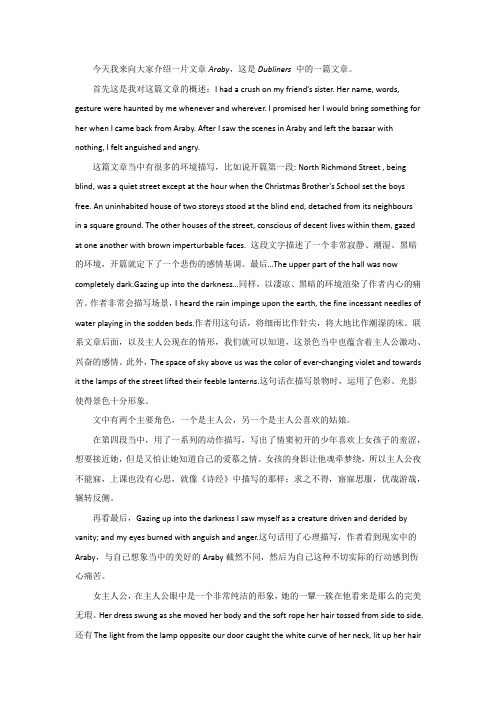
今天我来向大家介绍一片文章Araby,这是Dubliners 中的一篇文章。
首先这是我对这篇文章的概述:I had a crush on my friend’s sister. Her name, words, gesture were haunted by me whenever and wherever. I promised her I would bring something for her when I came back from Araby. After I saw the scenes in Araby and left the bazaar with nothing, I felt anguished and angry.这篇文章当中有很多的环境描写,比如说开篇第一段: North Richmond Street , being blind, was a quiet street except at the hour when the Christmas Brother’s School set the boys free. An uninhabited house of two storeys stood at the blind end, detached from its neighboursin a square ground. The other houses of the street, conscious of decent lives within them, gazed at one another with brown imperturbable faces. 这段文字描述了一个非常寂静、潮湿、黑暗的环境,开篇就定下了一个悲伤的感情基调。
最后…The upper part of the hall was now completely dark.Gazing up into the darkness…同样,以凄凉、黑暗的环境渲染了作者内心的痛苦。
《都柏林人》两个译本的比较分析
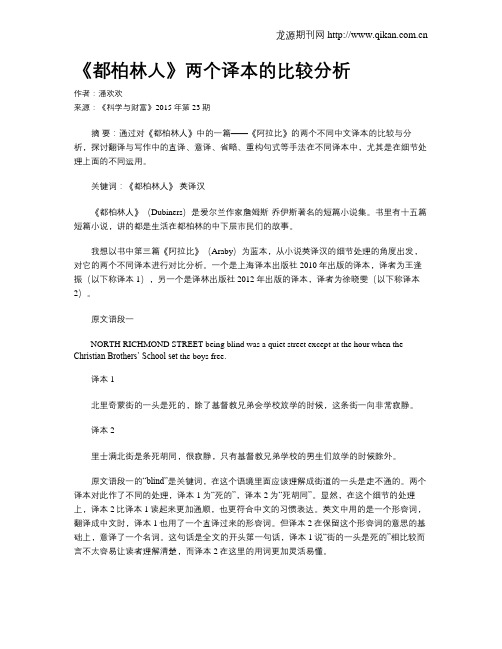
《都柏林人》两个译本的比较分析作者:潘欢欢来源:《科学与财富》2015年第23期摘要:通过对《都柏林人》中的一篇——《阿拉比》的两个不同中文译本的比较与分析,探讨翻译与写作中的直译、意译、省略、重构句式等手法在不同译本中,尤其是在细节处理上面的不同运用。
关键词:《都柏林人》英译汉《都柏林人》(Dubiners)是爱尔兰作家詹姆斯·乔伊斯著名的短篇小说集。
书里有十五篇短篇小说,讲的都是生活在都柏林的中下层市民们的故事。
我想以书中第三篇《阿拉比》(Araby)为蓝本,从小说英译汉的细节处理的角度出发,对它的两个不同译本进行对比分析。
一个是上海译本出版社2010年出版的译本,译者为王逢振(以下称译本1),另一个是译林出版社2012年出版的译本,译者为徐晓雯(以下称译本2)。
原文语段一NORTH RICHMOND STREET being blind was a quiet street except at the hour when the Christian Brothers’ School set the boys free.译本1北里奇蒙街的一头是死的,除了基督教兄弟会学校放学的时候,这条街一向非常寂静。
译本2里士满北街是条死胡同,很寂静,只有基督教兄弟学校的男生们放学的时候除外。
原文语段一的“blind”是关键词,在这个语境里面应该理解成街道的一头是走不通的。
两个译本对此作了不同的处理,译本1为“死的”,译本2为“死胡同”。
显然,在这个细节的处理上,译本2比译本1读起来更加通顺,也更符合中文的习惯表达。
英文中用的是一个形容词,翻译成中文时,译本1也用了一个直译过来的形容词。
但译本2在保留这个形容词的意思的基础上,意译了一个名词。
这句话是全文的开头第一句话,译本1说“街的一头是死的”相比较而言不太容易让读者理解清楚,而译本2在这里的用词更加灵活易懂。
另外原文中表述放学用了“set the boys free”,而译本1中只翻为“放学”,省去了“the boys”。
《《骆驼祥子》两个英译本的译者风格对比分析》范文
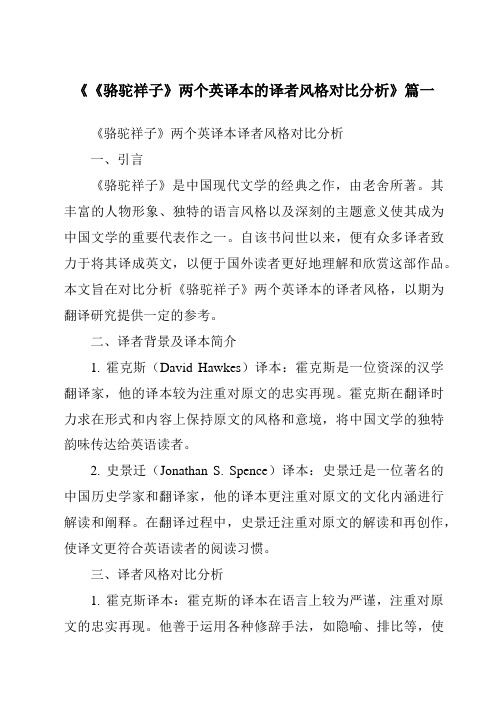
《《骆驼祥子》两个英译本的译者风格对比分析》篇一《骆驼祥子》两个英译本译者风格对比分析一、引言《骆驼祥子》是中国现代文学的经典之作,由老舍所著。
其丰富的人物形象、独特的语言风格以及深刻的主题意义使其成为中国文学的重要代表作之一。
自该书问世以来,便有众多译者致力于将其译成英文,以便于国外读者更好地理解和欣赏这部作品。
本文旨在对比分析《骆驼祥子》两个英译本的译者风格,以期为翻译研究提供一定的参考。
二、译者背景及译本简介1. 霍克斯(David Hawkes)译本:霍克斯是一位资深的汉学翻译家,他的译本较为注重对原文的忠实再现。
霍克斯在翻译时力求在形式和内容上保持原文的风格和意境,将中国文学的独特韵味传达给英语读者。
2. 史景迁(Jonathan S. Spence)译本:史景迁是一位著名的中国历史学家和翻译家,他的译本更注重对原文的文化内涵进行解读和阐释。
在翻译过程中,史景迁注重对原文的解读和再创作,使译文更符合英语读者的阅读习惯。
三、译者风格对比分析1. 霍克斯译本:霍克斯的译本在语言上较为严谨,注重对原文的忠实再现。
他善于运用各种修辞手法,如隐喻、排比等,使译文具有较高的艺术性。
在翻译过程中,霍克斯力求保留原文的文化特色和语言风格,为读者提供了一个了解中国文化的窗口。
2. 史景迁译本:史景迁的译本在语言上更为流畅自然,更符合英语读者的阅读习惯。
他善于运用地道的英语表达方式,将原文中的文化内涵进行解读和阐释,使译文更易于理解。
在翻译过程中,史景迁注重对原文的再创作,使译文更具可读性和吸引力。
3. 对比分析:霍克斯和史景迁的译本在风格上各有千秋。
霍克斯的译本更注重对原文的忠实再现和文化传承,而史景迁的译本则更注重对原文的解读和再创作。
这两种不同的翻译风格体现了两种不同的翻译理念和价值取向。
霍克斯的翻译风格更为传统,注重保留原文的语言形式和韵味;而史景迁的翻译风格更为开放,注重与英语读者的沟通和交流。
Araby英语短篇小说故事梗概

Araby英语短篇小说故事梗概第一篇:Araby英语短篇小说故事梗概Even though the narrator claims that he is clam and not crazy, he absolutely loses his mind and can’t control his behavior.The calmness that he attempts to show in the narration is the best proof of his insanity.we could tell how crazy the feeling of the narrator about the old man by his description of the old man.The narrator loves the old man but he can’t stand the old man’s vulture-like eye.He is so afraid of the eye that he decided to kill the old man.This abnormal decision shows how crazy the narrator is because no one would be so obsessed of an old man but so afraid of his eyes that tried to kill him.Some people may question his craziness since he was cautious and calm when he murdered the old man.However, the calmness was just temporary.He was irrational and went into illusion again when questioned by the police.He is in an extremely unstable mental state and the horrible idea in his mind has driven himself crazy.The perspective of first person narrator in the article made it possible for anyone to be the listener.Despite it seems to be story that the narrator wrote to everyone, I think it is possible that he just told what happened to himself instead of sharing his story with others.Given that he was totally out of control, he just intended to talk to himself.This might be a way for him to let himself calm down.He tried to recall all the things in order to prove that he was rational.I think the most horrible part in the story is the conversation the narrator said to himself.Since the crazy narrator attempted to show how calm he is, his rational words and mad behavior are the most obviously comparison.The narrator's emotional instability provides a clear counterargumentto his assertions of good judgment.It is impossible for a normal people to behave in such an inconsistent manner.: The protagonist of the “The Tell-Tale Heart” is a classic example of Poe's unreliable narrator, a man who cannot be trusted to tell the objective truth of what is occurring.His unreliability becomes immediately evident in the first paragraph of the story, when he insists on his clarity of mind and attributes any signs of madness to his nervousness and oversensitivity, particularly in the area of hearing.However, as soon as he finishes his declaration of sanity, he offers an account that has a series of apparent logical gaps that can only be explained by insanity.In his writings, Poe often sought to capture the state of mind of psychotic characters, and the narrator of this story exhibits leaps of reasoning that more resemble the logic of dreams than they do the thought processes of a normal human being.第二篇:英语小说读后感 A Book Report of ArabyA Book Report: “ Araby”“Araby”is a short story written by James Joyce, published in his 1914 collection Dubliners.In “Araby” James Joyce starts the story by adopting the first person point of view so as to give readers a sense that they are a part of the story.“I” , the narrator in the story, always reminds readers of their own adulthood.It helps us to recall our innocent and sweet love stories while we were at the age of the narrator’s.At the beginning of the story, the author describes the street where “I” lived as a secluded ,isolated and quiet place.As it is presented: “North Richmond Street, being blind, was a quiet street except at the hour when the Christian Brothers' School set the boys free.An uninhabited house of two storeys stood at the blind end, detached from its neighbors in a square ground.The other housesof the street, conscious of decent lives within them, gazed at one another with brown imperturbable faces.” [1] The setting reveals the dreary and tedious life of Dublin.Mangan’s sister appears in the narrator’s sight and l ightens his gloomy life.Apart from that, when Mangan’s sister talked about the bazaar with “I” , it is the first as well as the only conversation between the two characters.“I” acted as a brave knight who fight for his romantic and ideal lover and went to the bazaar—Araby.After an intolerable and unpleasant journey on the train, the narrator eventually came to the bazaar, but just turned out to be an disappointed place.He became angry and anguished.Even the readers feel sympathy for his suffering.In fact, t he “Araby” much seems like an mysterious and exotic part of the world.It merely exists in one’s imagination.Mangan’s sister is considered as a symbol of brightness, helping him escaping from the current tedious daily life, which unfortunately can only last for a short period.Everyone are bound to experience frustration when entering the adults’ world.A young, sensitive and innocent boy will grow to be mature and disillusioned.Works Cited [1] Joyce, J(1914).Dubliners.London: Grant Richards.第三篇:如何写故事梗概如何写故事梗概就是简要地把故事说出来,也就是讲述大意。
《阿拉比》的瘫痪意象-2019年精选文档
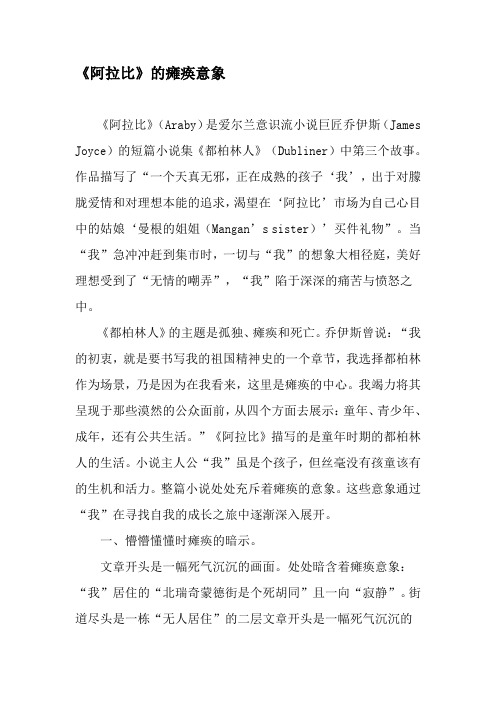
《阿拉比》的瘫痪意象《阿拉比》(Araby)是爱尔兰意识流小说巨匠乔伊斯(James Joyce)的短篇小说集《都柏林人》(Dubliner)中第三个故事。
作品描写了“一个天真无邪,正在成熟的孩子‘我’,出于对朦胧爱情和对理想本能的追求,渴望在‘阿拉比’市场为自己心目中的姑娘‘曼根的姐姐(Mangan’s sister)’买件礼物”。
当“我”急冲冲赶到集市时,一切与“我”的想象大相径庭,美好理想受到了“无情的嘲弄”,“我”陷于深深的痛苦与愤怒之中。
《都柏林人》的主题是孤独、瘫痪和死亡。
乔伊斯曾说:“我的初衷,就是要书写我的祖国精神史的一个章节,我选择都柏林作为场景,乃是因为在我看来,这里是瘫痪的中心。
我竭力将其呈现于那些漠然的公众面前,从四个方面去展示:童年、青少年、成年,还有公共生活。
”《阿拉比》描写的是童年时期的都柏林人的生活。
小说主人公“我”虽是个孩子,但丝毫没有孩童该有的生机和活力。
整篇小说处处充斥着瘫痪的意象。
这些意象通过“我”在寻找自我的成长之旅中逐渐深入展开。
一、懵懵懂懂时瘫痪的暗示。
文章开头是一幅死气沉沉的画面。
处处暗含着瘫痪意象:“我”居住的“北瑞奇蒙德街是个死胡同”且一向“寂静”。
街道尽头是一栋“无人居住”的二层文章开头是一幅死气沉沉的画面。
处处暗含着瘫痪意象:“我”居住的“北瑞奇蒙德街是个死胡同”且一向“寂静”。
街道尽头是一栋“无人居住”的二层楼房。
街坊们的脸色都是无生命的“褐色。
“我们以前的房客,一个教士,死在屋子后面的客厅里。
”寂静的死胡同了无生气,满目所见尽是荒凉。
乔伊斯借助对景物的描写很好地展示了小说的主题,令读者对瘫痪意象有了初步了解。
“我”和伙伴们在街上玩耍,但“白昼极短的冬日,晚饭还没结束,夜幕就降临了。
当我们在街上相见时一栋栋房屋变得阴森森”,就连空气亦“寒冷逼人”。
在这样的环境里,“我”悄悄喜欢上了“曼根的姐姐”。
在我的脑海中“曼根的姐姐”的形象是模糊的,“我”总是“在暗中瞧着她”,“灯光从半掩的门里射出来,映现出她的身影”。
Araby_中英译文
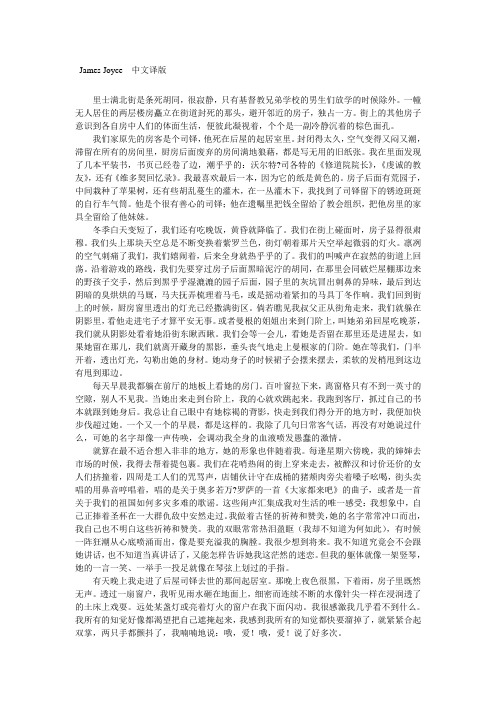
James Joyce 中文译版里士满北街是条死胡同,很寂静,只有基督教兄弟学校的男生们放学的时候除外。
一幢无人居住的两层楼房矗立在街道封死的那头,避开邻近的房子,独占一方。
街上的其他房子意识到各自房中人们的体面生活,便彼此凝视着,个个是一副冷静沉着的棕色面孔。
我们家原先的房客是个司铎,他死在后屋的起居室里。
封闭得太久,空气变得又闷又潮,滞留在所有的房间里,厨房后面废弃的房间满地狼藉,都是写无用的旧纸张。
我在里面发现了几本平装书,书页已经卷了边,潮乎乎的:沃尔特?司各特的《修道院院长》,《虔诚的教友》,还有《维多契回忆录》。
我最喜欢最后一本,因为它的纸是黄色的。
房子后面有荒园子,中间栽种了苹果树,还有些胡乱蔓生的灌木,在一丛灌木下,我找到了司铎留下的锈迹斑斑的自行车气筒。
他是个很有善心的司铎;他在遗嘱里把钱全留给了教会组织,把他房里的家具全留给了他妹妹。
冬季白天变短了,我们还有吃晚饭,黄昏就降临了。
我们在街上碰面时,房子显得很肃穆。
我们头上那块天空总是不断变换着紫罗兰色,街灯朝着那片天空举起微弱的灯火。
凛冽的空气刺痛了我们,我们嬉闹着,后来全身就热乎乎的了。
我们的叫喊声在寂然的街道上回荡。
沿着游戏的路线,我们先要穿过房子后面黑暗泥泞的胡同,在那里会同破烂屋棚那边来的野孩子交手,然后到黑乎乎湿漉漉的园子后面,园子里的灰坑冒出刺鼻的异味,最后到达阴暗的臭烘烘的马厩,马夫抚弄梳理着马毛,或是摇动着紧扣的马具丁冬作响。
我们回到街上的时候,厨房窗里透出的灯光已经撒满街区。
倘若瞧见我叔父正从街角走来,我们就躲在阴影里,看他走进宅子才算平安无事。
或者曼根的姐姐出来到门阶上,叫她弟弟回屋吃晚茶,我们就从阴影处看着她沿街东瞅西瞅。
我们会等一会儿,看她是否留在那里还是进屋去,如果她留在那儿,我们就离开藏身的黑影,垂头丧气地走上曼根家的门阶。
她在等我们,门半开着,透出灯光,勾勒出她的身材。
她动身子的时候裙子会摆来摆去,柔软的发梢甩到这边有甩到那边。
小说Araby两个译本之评析
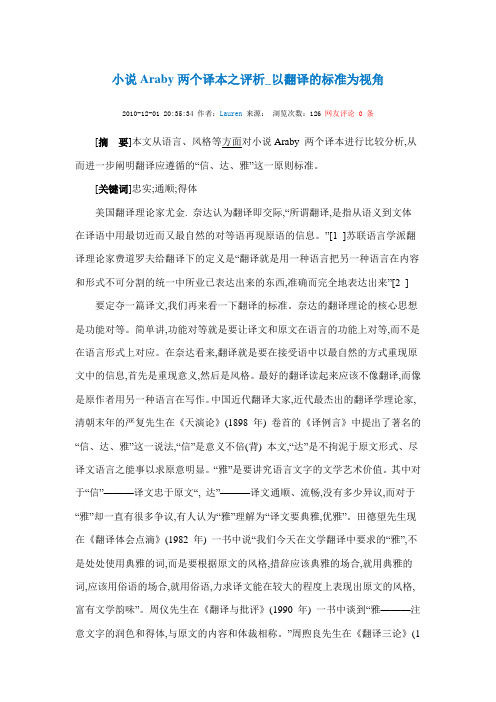
小说Araby两个译本之评析_以翻译的标准为视角2010-12-01 20:35:34 作者:Lauren来源:浏览次数:126 网友评论 0 条[摘要]本文从语言、风格等方面对小说Araby 两个译本进行比较分析,从而进一步阐明翻译应遵循的“信、达、雅”这一原则标准。
[关键词]忠实;通顺;得体美国翻译理论家尤金. 奈达认为翻译即交际,“所谓翻译,是指从语义到文体在译语中用最切近而又最自然的对等语再现原语的信息。
”[1 ]苏联语言学派翻译理论家费道罗夫给翻译下的定义是“翻译就是用一种语言把另一种语言在内容和形式不可分割的统一中所业已表达出来的东西,准确而完全地表达出来”[2 ]要定夺一篇译文,我们再来看一下翻译的标准。
奈达的翻译理论的核心思想是功能对等。
简单讲,功能对等就是要让译文和原文在语言的功能上对等,而不是在语言形式上对应。
在奈达看来,翻译就是要在接受语中以最自然的方式重现原文中的信息,首先是重现意义,然后是风格。
最好的翻译读起来应该不像翻译,而像是原作者用另一种语言在写作。
中国近代翻译大家,近代最杰出的翻译学理论家, 清朝末年的严复先生在《天演论》(1898 年) 卷首的《译例言》中提出了著名的“信、达、雅”这一说法,“信”是意义不倍(背) 本文,“达”是不拘泥于原文形式、尽译文语言之能事以求原意明显。
“雅”是要讲究语言文字的文学艺术价值。
其中对于“信”———译文忠于原文“, 达”———译文通顺、流畅,没有多少异议,而对于“雅”却一直有很多争议,有人认为“雅”理解为“译文要典雅,优雅”。
田德望先生现在《翻译体会点滴》(1982 年) 一书中说“我们今天在文学翻译中要求的“雅”,不是处处使用典雅的词,而是要根据原文的风格,措辞应该典雅的场合,就用典雅的词,应该用俗语的场合,就用俗语,力求译文能在较大的程度上表现出原文的风格,富有文学韵味”。
周仪先生在《翻译与批评》(1990 年) 一书中谈到“雅———注意文字的润色和得体,与原文的内容和体裁相称。
现实不浪漫— Araby中对比手法的分析
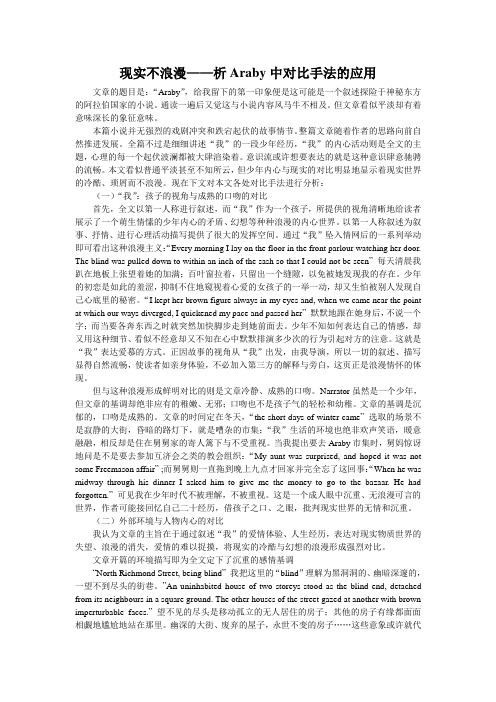
现实不浪漫——析Araby中对比手法的应用文章的题目是:“Araby”,给我留下的第一印象便是这可能是一个叙述探险于神秘东方的阿拉伯国家的小说。
通读一遍后又觉这与小说内容风马牛不相及。
但文章看似平淡却有着意味深长的象征意味。
本篇小说并无强烈的戏剧冲突和跌宕起伏的故事情节。
整篇文章随着作者的思路向前自然推进发展。
全篇不过是细细讲述“我”的一段少年经历,“我”的内心活动则是全文的主题,心理的每一个起伏波澜都被大肆渲染着。
意识流或许想要表达的就是这种意识肆意驰骋的流畅。
本文看似普通平淡甚至不知所云,但少年内心与现实的对比明显地显示着现实世界的冷酷、琐屑而不浪漫。
现在下文对本文各处对比手法进行分析:(一)“我”:孩子的视角与成熟的口吻的对比首先,全文以第一人称进行叙述,而“我”作为一个孩子,所提供的视角清晰地给读者展示了一个萌生情愫的少年内心的矛盾、幻想等种种浪漫的内心世界。
以第一人称叙述为叙事、抒情、进行心理活动描写提供了很大的发挥空间。
通过“我”坠入情网后的一系列举动“Every morning I lay on the floor in the front parlour watching her door. 即可看出这种浪漫主义:The blind was pulled down to within an inch of the sash so that I could not be seen”每天清晨我趴在地板上张望着她的加满;百叶窗拉着,只留出一个缝隙,以免被她发现我的存在。
少年的初恋是如此的羞涩,抑制不住地窥视着心爱的女孩子的一举一动,却又生怕被别人发现自己心底里的秘密。
“I kept her brown figure always in my eyes and, when we came near the point at which our ways diverged, I quickened my pace and passed her”默默地跟在她身后,不说一个字;而当要各奔东西之时就突然加快脚步走到她前面去。
小说Araby两个译本之评析——以翻译的标准为视角
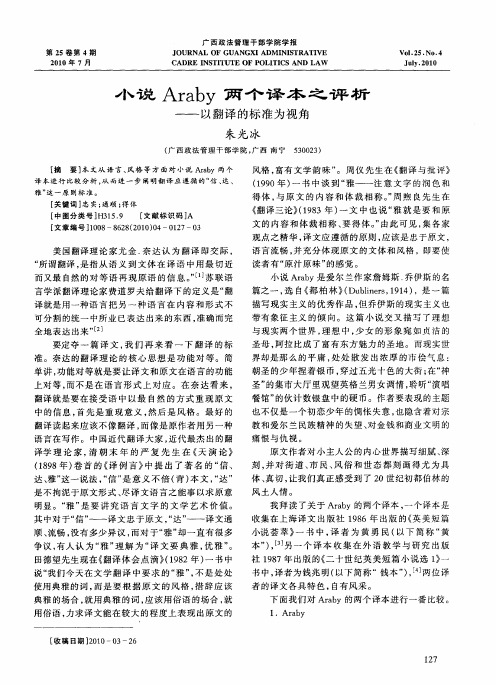
“ 所谓 翻译 , 指 从语 义 到文 体 在 译 语 中 用最 切 近 是 而又最 自然 的对 等 语 再 现 原语 的信 息 。 苏 联语 ” 言学 派翻译 理论 家费道 罗 夫给 翻译下 的定 义是 “ 翻 译就 是用一种 语 言把 另 一 种 语 言 在 内容 和形 式 不
可分 割的统 一 中所 业 已表达 出来 的东 西 , 准确而 完
语 言在 写作 。 中国近代 翻译 大家 , 近代 最杰 出的翻
译学 理 论 家 , 朝 末 年 的 严 复 先 生 在 《 演 论 》 清 天
(8 8年 ) 首 的 《 例 言 》 提 出 了 著 名 的 “ 、 19 卷 译 中 信
达 、 这一 说法 , 信 ” 意 义 不倍 ( ) 文 , 达 ” 雅” “ 是 背 本 “ 是不拘泥 于原 文形式 、 尽译 文语 言之能 事 以求 原意 明显 。“ 是 要 讲 究 语 言 文 字 的 文 学 艺 术 价 值 。 雅” 其 中对 于“ ” 信 —— 译 文 忠于原 文 ,达 ” “ —— 译 文通 顺、 流畅 , 没有 多少异 议 , 而对 于“ ” 一直 有很多 雅 却 争议 , 有人 认 为 “ ” 解 为 “ 文 要 典 雅 , 雅 ” 雅 理 译 优 。
书 中, 者为 钱兆 明 ( 译 以下简称 “钱本 ” , 两位译 ) J
者 的译 文各具 特 色 , 自有风采 。 下 面我们 对 Arb a y的两个 译本 进行一 番 比较 。
界却是那 么 的平 庸 , 处 散 发 出浓厚 的市侩 气 息 : 处
朝圣 的少年 捏着银 币 , 穿过 五光 十色 的大街 ; “ 在 神
圣” 的集 市大 厅里 观望 英格 兰男 女调情 , 聆听“ 唱 演
Araby赏析
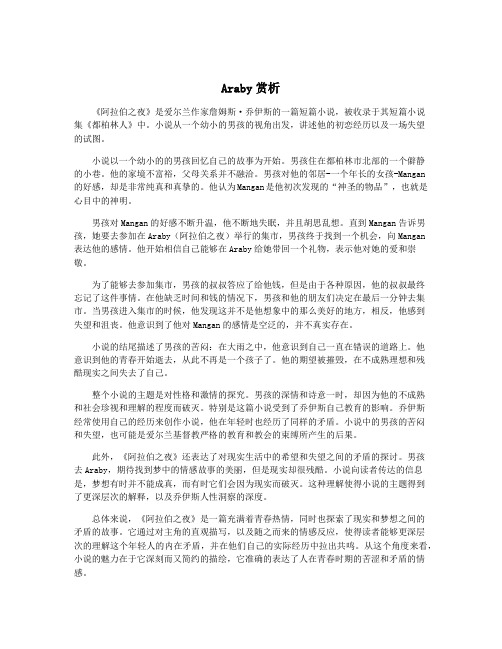
Araby赏析《阿拉伯之夜》是爱尔兰作家詹姆斯·乔伊斯的一篇短篇小说,被收录于其短篇小说集《都柏林人》中。
小说从一个幼小的男孩的视角出发,讲述他的初恋经历以及一场失望的试图。
小说以一个幼小的的男孩回忆自己的故事为开始。
男孩住在都柏林市北部的一个僻静的小巷。
他的家境不富裕,父母关系并不融洽。
男孩对他的邻居-一个年长的女孩-Mangan的好感,却是非常纯真和真挚的。
他认为Mangan是他初次发现的“神圣的物品”,也就是心目中的神明。
男孩对Mangan的好感不断升温,他不断地失眠,并且胡思乱想。
直到Mangan告诉男孩,她要去参加在Araby(阿拉伯之夜)举行的集市,男孩终于找到一个机会,向Mangan表达他的感情。
他开始相信自己能够在Araby给她带回一个礼物,表示他对她的爱和崇敬。
为了能够去参加集市,男孩的叔叔答应了给他钱,但是由于各种原因,他的叔叔最终忘记了这件事情。
在他缺乏时间和钱的情况下,男孩和他的朋友们决定在最后一分钟去集市。
当男孩进入集市的时候,他发现这并不是他想象中的那么美好的地方,相反,他感到失望和沮丧。
他意识到了他对Mangan的感情是空泛的,并不真实存在。
小说的结尾描述了男孩的苦闷:在大雨之中,他意识到自己一直在错误的道路上。
他意识到他的青春开始逝去,从此不再是一个孩子了。
他的期望被摧毁,在不成熟理想和残酷现实之间失去了自己。
整个小说的主题是对性格和激情的探究。
男孩的深情和诗意一时,却因为他的不成熟和社会珍视和理解的程度而破灭。
特别是这篇小说受到了乔伊斯自己教育的影响。
乔伊斯经常使用自己的经历来创作小说,他在年轻时也经历了同样的矛盾。
小说中的男孩的苦闷和失望,也可能是爱尔兰基督教严格的教育和教会的束缚所产生的后果。
此外,《阿拉伯之夜》还表达了对现实生活中的希望和失望之间的矛盾的探讨。
男孩去Araby,期待找到梦中的情感故事的美丽,但是现实却很残酷。
小说向读者传达的信息是,梦想有时并不能成真,而有时它们会因为现实而破灭。
Araby文章浅析
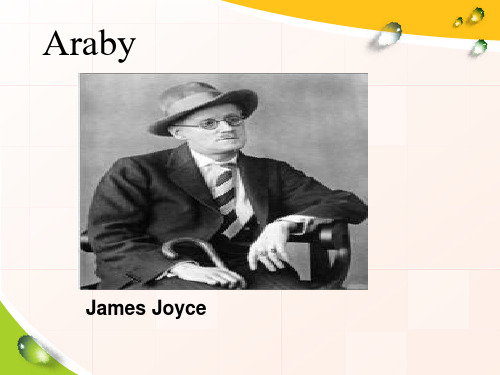
• This article mainly tells about a boy who secretly loves a neighboring girl, Mangan’s sister. This simple and pure love can be revealed through his action, his self-narration and his mentality, which can be best revealed in some sentences in the work.
Para1:
1.blind
This word sets the basic tone for the whole environment in which the boy lives,as seen in other other words like "uninhabited," "detached," "brown," "imperturbable" ---quickly presents a world that is solemn, indifferent, desolate, cold and dull.
Araby
James Joyce
About the Author
• James Joyce: an Irish novelist, noted for his experimental use of language in such works as Ulysses (1922) and Finneganns Wake (1939). Joyce’s technical innovations in the art of the novel include an extensive use of interior monologue; he used a complex network of symbolic parallels drawn from the mythology, history, and literature, and created a unique language of invented words, puns, and allusions. He is one of the most innovative novelists of the 20th century and one of the great masters of “the stream of consciousness”
araby读后感英文
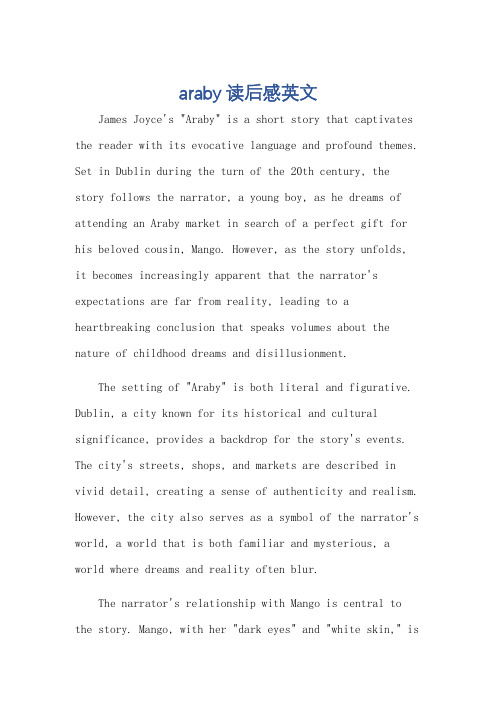
araby读后感英文James Joyce's "Araby" is a short story that captivates the reader with its evocative language and profound themes. Set in Dublin during the turn of the 20th century, the story follows the narrator, a young boy, as he dreams of attending an Araby market in search of a perfect gift for his beloved cousin, Mango. However, as the story unfolds, it becomes increasingly apparent that the narrator's expectations are far from reality, leading to a heartbreaking conclusion that speaks volumes about the nature of childhood dreams and disillusionment.The setting of "Araby" is both literal and figurative. Dublin, a city known for its historical and cultural significance, provides a backdrop for the story's events. The city's streets, shops, and markets are described in vivid detail, creating a sense of authenticity and realism. However, the city also serves as a symbol of the narrator's world, a world that is both familiar and mysterious, a world where dreams and reality often blur.The narrator's relationship with Mango is central to the story. Mango, with her "dark eyes" and "white skin," isthe idealized object of the narrator's affection. He views her as perfect, as someone who embodies all his dreams and aspirations. His desire to find a perfect gift for her at the Araby market reflects his desire to please her and win her approval. However, as the story progresses, it becomes clear that Mango is not as perfect as the narrator had imagined. Her flaws and imperfections shatter his illusions, leaving him feeling disappointed and betrayed.The Araby market itself is a symbol of the narrator's dreams and aspirations. He imagines it as a magical place where he can find the perfect gift that will win Mango's heart. However, when he finally arrives at the market, he finds it to be a disappointing and even surreal experience. The shops are empty, the streets are deserted, and the atmosphere is far from the bustling and vibrant market he had envisioned. This contrast between the narrator's expectations and reality is a powerful testament to the disillusioning nature of childhood dreams.The ending of "Araby" is particularly heartbreaking. As the narrator returns home, he realizes that Mango has already forgotten about the gift he had intended to giveher. This moment of realization is both a moment of liberation and a moment of heartbreak. The narrator finally realizes that his dreams and aspirations are not rooted in reality, but in his own imagination. However, this realization comes at a cost: he has lost the innocence and idealism of childhood, replaced by a sense of cynicism and disillusionment."Araby" is a profound exploration of childhood dreams and disillusionment. Through the narrator's journey, we are reminded that while dreams can be powerful motivators, they can also lead to disappointment and heartbreak. The story teaches us that while it is important to dream and aspire, it is also crucial to maintain a sense of realism and groundedness. Otherwise, we may find ourselves lost in a world of illusions, unable to distinguish between what is real and what is merely a figment of our imagination.**《阿拉比》读后感:童年的梦想与幻灭**詹姆斯·乔伊斯的短篇小说《阿拉比》以其生动的语言和深刻的主题深深吸引了读者。
Araby翻译
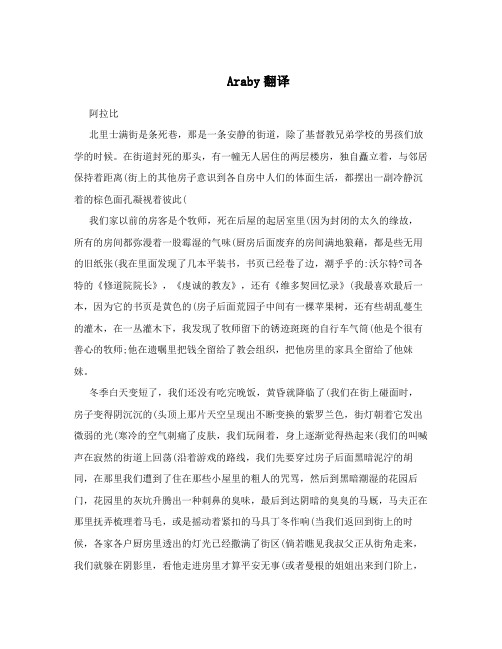
Araby翻译阿拉比北里士满街是条死巷,那是一条安静的街道,除了基督教兄弟学校的男孩们放学的时候。
在街道封死的那头,有一幢无人居住的两层楼房,独自矗立着,与邻居保持着距离(街上的其他房子意识到各自房中人们的体面生活,都摆出一副冷静沉着的棕色面孔凝视着彼此(我们家以前的房客是个牧师,死在后屋的起居室里(因为封闭的太久的缘故,所有的房间都弥漫着一股霉湿的气味(厨房后面废弃的房间满地狼藉,都是些无用的旧纸张(我在里面发现了几本平装书,书页已经卷了边,潮乎乎的:沃尔特?司各特的《修道院院长》,《虔诚的教友》,还有《维多契回忆录》(我最喜欢最后一本,因为它的书页是黄色的(房子后面荒园子中间有一棵苹果树,还有些胡乱蔓生的灌木,在一丛灌木下,我发现了牧师留下的锈迹斑斑的自行车气筒(他是个很有善心的牧师;他在遗嘱里把钱全留给了教会组织,把他房里的家具全留给了他妹妹。
冬季白天变短了,我们还没有吃完晚饭,黄昏就降临了(我们在街上碰面时,房子变得阴沉沉的(头顶上那片天空呈现出不断变换的紫罗兰色,街灯朝着它发出微弱的光(寒冷的空气刺痛了皮肤,我们玩闹着,身上逐渐觉得热起来(我们的叫喊声在寂然的街道上回荡(沿着游戏的路线,我们先要穿过房子后面黑暗泥泞的胡同,在那里我们遭到了住在那些小屋里的粗人的咒骂,然后到黑暗潮湿的花园后门,花园里的灰坑升腾出一种刺鼻的臭味,最后到达阴暗的臭臭的马厩,马夫正在那里抚弄梳理着马毛,或是摇动着紧扣的马具丁冬作响(当我们返回到街上的时候,各家各户厨房里透出的灯光已经撒满了街区(倘若瞧见我叔父正从街角走来,我们就躲在阴影里,看他走进房里才算平安无事(或者曼根的姐姐出来到门阶上,叫她弟弟回屋吃晚茶,我们就从阴影处看着她沿街东瞅西瞅(我们会等一会儿,看她是否留在那里还是进屋去,如果她留在那儿,我们就离开藏身的阴影,无可奈何地走上曼根家的门阶(她在等我们,半开的门里透出的灯光勾勒出她的身型。
他的弟弟总在乖乖的顺从前先逗弄她一番(我就站在栏杆前凝望着她(她的裙子随着身体的移动来回的摇摆着,柔软的发辫也随之左右摆动。
- 1、下载文档前请自行甄别文档内容的完整性,平台不提供额外的编辑、内容补充、找答案等附加服务。
- 2、"仅部分预览"的文档,不可在线预览部分如存在完整性等问题,可反馈申请退款(可完整预览的文档不适用该条件!)。
- 3、如文档侵犯您的权益,请联系客服反馈,我们会尽快为您处理(人工客服工作时间:9:00-18:30)。
小说Araby两个译本之评析_以翻译的标准为视角2010-12-01 20:35:34 作者:Lauren来源:浏览次数:126 网友评论 0 条[摘要]本文从语言、风格等方面对小说Araby 两个译本进行比较分析,从而进一步阐明翻译应遵循的“信、达、雅”这一原则标准。
[关键词]忠实;通顺;得体
美国翻译理论家尤金. 奈达认为翻译即交际,“所谓翻译,是指从语义到文体在译语中用最切近而又最自然的对等语再现原语的信息。
”[1 ]苏联语言学派翻译理论家费道罗夫给翻译下的定义是“翻译就是用一种语言把另一种语言在内容和形式不可分割的统一中所业已表达出来的东西,准确而完全地表达出来”[2 ]要定夺一篇译文,我们再来看一下翻译的标准。
奈达的翻译理论的核心思想是功能对等。
简单讲,功能对等就是要让译文和原文在语言的功能上对等,而不是在语言形式上对应。
在奈达看来,翻译就是要在接受语中以最自然的方式重现原文中的信息,首先是重现意义,然后是风格。
最好的翻译读起来应该不像翻译,而像是原作者用另一种语言在写作。
中国近代翻译大家,近代最杰出的翻译学理论家, 清朝末年的严复先生在《天演论》(1898 年) 卷首的《译例言》中提出了著名的“信、达、雅”这一说法,“信”是意义不倍(背) 本文,“达”是不拘泥于原文形式、尽译文语言之能事以求原意明显。
“雅”是要讲究语言文字的文学艺术价值。
其中对于“信”———译文忠于原文“, 达”———译文通顺、流畅,没有多少异议,而对于“雅”却一直有很多争议,有人认为“雅”理解为“译文要典雅,优雅”。
田德望先生现在《翻译体会点滴》(1982 年) 一书中说“我们今天在文学翻译中要求的“雅”,不是处处使用典雅的词,而是要根据原文的风格,措辞应该典雅的场合,就用典雅的词,应该用俗语的场合,就用俗语,力求译文能在较大的程度上表现出原文的风格,富有文学韵味”。
周仪先生在《翻译与批评》(1990 年) 一书中谈到“雅———注意文字的润色和得体,与原文的内容和体裁相称。
”周煦良先生在《翻译三论》(1
983 年) 一文中也说“雅就是要和原文的内容和体裁相称、要得体。
”由此可见,集各家观点之精华,译文应遵循的原则,应该是忠于原文,语言流畅,并充分体现原文的文体和风格, 即要使读者有“原汁原味”的感觉。
小说Araby 是爱尔兰作家詹姆斯. 乔伊斯的名篇之一,选自《都柏林》(Dubl iners ,1914) , 是一篇描写现实主义的优秀作品,但乔伊斯的现实主义也带有象征主义的倾向。
这篇小说交叉描写了理想与现实两个世界,理想中,少女的形象宛如贞洁的圣母,阿拉比成了富有东方魅力的圣地。
而现实世界却是那么的平庸,处处散发出浓厚的市侩气息:朝圣的少年捏着银币,穿过五光十色的大街;在“神圣”的集市大厅里观望英格兰男女调情,聆听“演唱餐馆”的伙计数银盘中的硬币。
作者要表现的主题也不仅是一个初恋少年的惆怅失意,也隐含着对宗教和爱尔兰民族精神的失望、对金钱和商业文明的痛恨与仇视。
原文作者对小主人公的内心世界描写细腻、深刻,并对街道、市民、风俗和世态都刻画得尤为具体、真切,让我们真正感受到了20 世纪初都伯林的风土人情。
我拜读了关于Araby 的两个译本,一个译本是收集在上海译文出版社1986 年出版的《英美短篇小说荟萃》一书中,译者为黄勇民(以下简称“黄本”) ,[3 ]另一个译本收集在外语教学与研究出版社1987 年出版的《二十世纪英美短篇小说选1》一书中,译者为钱兆明(以下简称“ 钱本”) ,[4 ]两位译者的译文各具特色,自有风采。
下面我们对Araby 的两个译本进行一番比较。
1.Araby
黄本《: 初恋》
钱本《: 阿拉比》
Araby 是小说的标题。
这里可以看出钱本译为《阿拉比》是音译。
阿拉比是一个富有东方色彩的大集市,也是小主人公希望达成他初恋心愿的一个神圣的地
方,因此我们也不难理解黄本译作《初恋》的原由,尽管从字面上看它们毫不相干,这一点使我想起名著Gong with the Wind ,一种译法是《飘》,另一种译法则是《乱世佳人》,其实两种译法都未尝不可。
前一种译法可以说是直译,后一种译法是译者在了解了作品内容之后的意译。
北京大学辜正坤教授在讨论文学翻译时,对直译和意译有这么一段精彩的论述:“直译,意译,各有千秋,译者依据功能、审美、读者层三要素,宜直译就直译,宜意译就意译,能神游于规矩之内,亦能神游于规矩之外,能循规蹈矩,亦能叛道离经,方称得上翻译的行家里手。
”当然意译必须是在忠于原文的基础上的。
2. North Richmond Street , being blind , was a quiet street except at the hour when Chri stian Brothers’ school set the boys free. An uninhabited house of two storey’s stood at the blind end , detached from it s neighbors’ in a sq uare ground. The other houses of the street , conscious of decent within them , gazed at another with brown imperturbable faces.
黄本:北里奇蒙大街是一条死胡同。
因此,在每天基督徒兄弟学校放学以前,
它总是静悄悄的。
死胡同的尽头有一所无人居住的两层楼楼房。
它坐落在一块四方形的场地上,与其他房屋之间有着一定的距离。
街上的其他房屋都呈棕褐色,也许是意识到它们里边居住的都是一些体面人物,它们都以冷静严肃的目光相互凝视着。
钱本:北利奇蒙特街的一头是堵死的,除了基督教兄弟学校放学那段时间外,
平时街上都很寂静。
街的尽头是座无人居住的两层楼房,它同相邻的房子隔开,坐落在一块方地上。
街上别的房子,仿佛自知住着体面的人家,都沉着棕色的脸,相互对峙着。
很显然,钱本更忠于原文,而黄本不但做到了“信”,更做到了“雅”,许渊冲先生
在《翻译:美化之艺术———新旧世纪交谈录》(1998 年) 一文中说“在翻译中做到“信”是有标准,做到“雅”才是高标准。
在奈达的翻译理论“功能对等”这一概念中,
他认为译文在形式上的对应是机械的,表面上和原文一样,但由于语言系统不同,相同的语言形式并不一定能起到相同的效果。
黄本在不违背原文的条件下,语言自然流畅,符合汉语的表达习惯,又充分体现了原文的风格。
3. Air , musty from having been long dosed ,hung in all the rooms , and the waste behind the kitch was littened with old useless papers.
黄本:由于长期关闭着,所有的房间都弥漫着霉臭的空气,厨房后边的杂物间里丢满了杂乱的废纸。
钱本:由于长期关闭着,所有的房间都散发出一股霉臭味儿,厨房后边的杂物间里乱糟糟地堆放了好些无用的旧文件。
“papers”一词是“文件、试卷、论文”,而非一般的“纸”,而且,此间房里住的曾是为教士,因此“olduseless papers”我认为钱本译为“无用的旧文件”更准确。
4. Her dress swung as she moved her body and the soft rope of her hair tossed from side to side.
黄本:她的衣服随着她的身子的摆动而飘动,她那柔软的束发带来回晃动着。
钱本:她身子一动,裙子便摆动起来,她那松软的辫子也随之左右摇摆。
在这里,两位译者对”rope”一词的理解不同,“rope”原意为“粗绳、索”,亦可译为“被扭在、穿在或串在一起的东西”,因此,把“rope”译为“束发带”我认为不太适合,而译为“辫子”则比较准确。
5. And yet her name was like a summons to all my foolish blood.
黄本:然而,她的名字宛如战斗的号角,会使我这个愚蠢的家伙热血沸腾。
钱本:可是她的名字却好像能召唤我全部幼稚的情感。
“summons”一词意思是“召唤”,显然黄本译为“战斗的号角”太过于夸张,而钱本又未能准确地表达出小主人公对初恋对象的那种强烈的爱慕之情。
我想译为“然而,她的名字总如一声召唤,会令我这个蠢家伙热血沸腾”更恰当些。
6. These noises wnverged in a single sensation of life for me : Imagined that I bore my chalice safely through a throng of foes.
黄本:在我心目中,这各色各样的声响汇成了一股生活的激情:我想象着自己捧着圣餐酒杯,安
全通过了一大群敌人的包围。
钱本:这些声音在我耳中汇成一种单纯的人生感受:自己仿佛捧着圣餐酒杯平安地穿过一群仇敌。
关键词:小说两个译本。
